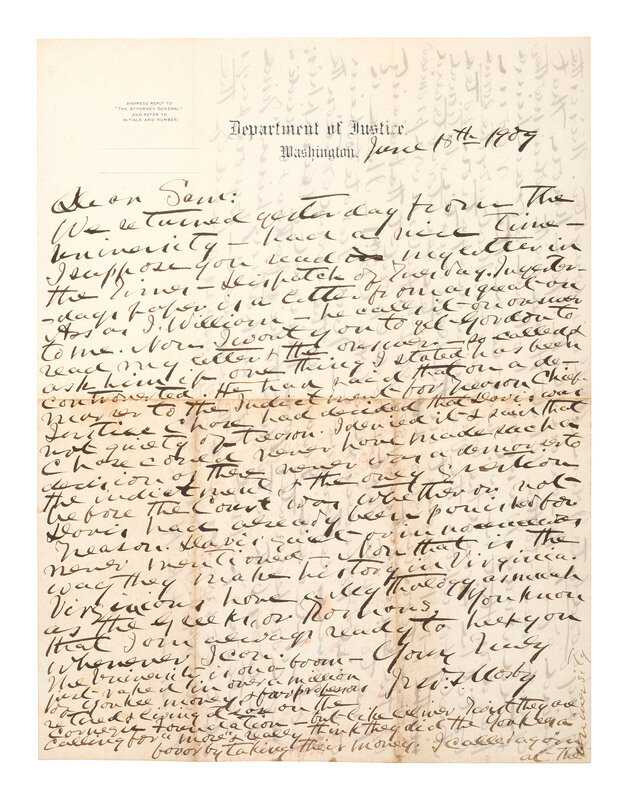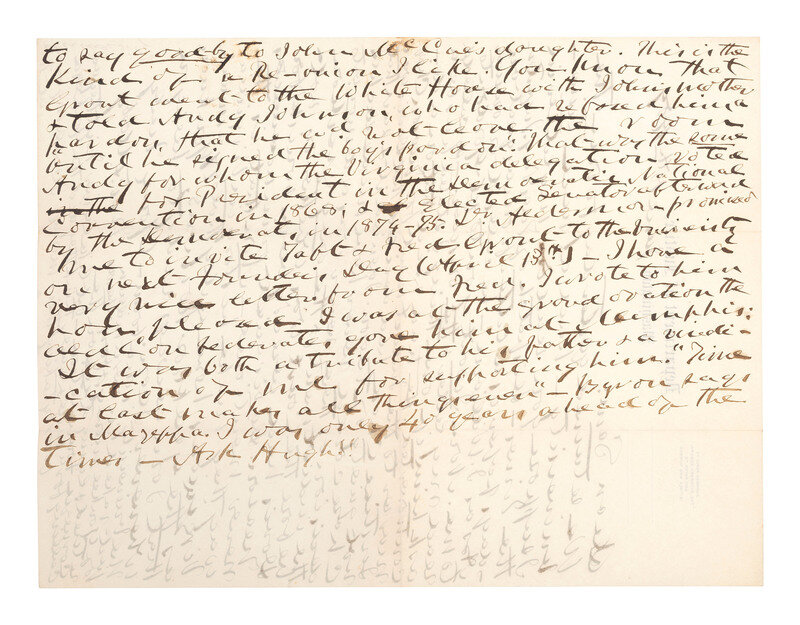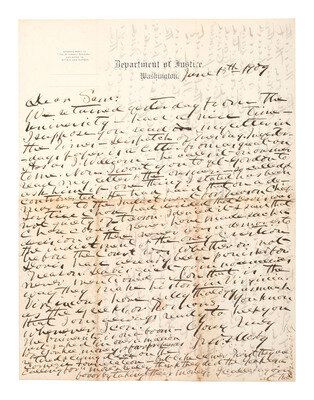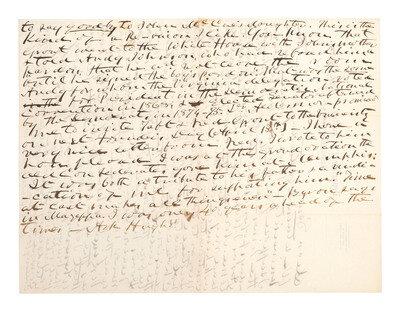Lot 36
MOSBY, JOHN S. (1833-1916). ALS to Captain Samuel F. Chapman. Washington, DC, 18 June 1909. Discussing the indictment of Jefferson Davis for treason, the pardoning of Mosby's ranger John McCue, and Mosby's support of Ulysses S. Grant.
Sale 1344 - American Historical Ephemera and Photography
May 31, 2024
10:00AM ET
Live / Cincinnati
Own a similar item?
Estimate
$600 -
800
Price Realized
$889
Sold prices are inclusive of Buyer’s Premium
Lot Description
MOSBY, JOHN S. (1833-1916). ALS to Captain Samuel F. Chapman. Washington, DC, 18 June 1909. Discussing the indictment of Jefferson Davis for treason, the pardoning of Mosby's ranger John McCue, and Mosby's support of Ulysses S. Grant.
2 pages, 8 x 10 1/2 in., old folds, toning soiling, and some reddish residue to portions. On Department of Justice letterhead.
Mosby writes again to "Sam," referencing a letter that appeared in the Times Dispatch the prior Tuesday, which was answered by "as great an Ass as J. William" in the previous day's paper. Mosby asks Sam to have another person read both his letter and William's reply, to see if William successfully controverted any of Mosby's statements. The letters apparently debated aspects of the indictment of Jefferson Davis for treason.
Mosby writes: "...the only question before the Court was whether or not Davis had already been punished for treason. Davis' guilt or innocence was never mentioned. Now that is the way they make history in Virginia. Virginians have a mythology as much as the Greeks or Romans."
Mosby closes and signs the letter, but continues writing below and on verso, stating that "The University" is on a boom, having received over a million dollars of "Yankee money." He mentions that he went to the university in order to say goodbye to the daughter of a man named John McCue.
He writes: "This is the kind of a Re-union I like. You know that Grant went to the White House with John's mother & told Andy Johnson, who had refused him a pardon, that he wd. not leave the room until he signed the boy's pardon. That was the same Andy for whom the Virginia delegation voted for President in the Democratic National Convention in 1868..."
Mosby then mentions that a professor at the university promised to invite Taft and Fred Grant (the son of Ulysses S. Grant) to an event at the school. Mosby answered a letter from Fred Grant recently, which he describes, in part: "I wrote to him how pleased I was at the grand ovation the old Confederates gave him at Memphis: It was both a tribute to his father & a vindication of me for supporting him...I was only 40 years ahead of the times - Ask Hugh!!"
John W. McCue was one of Mosby's rangers, who was scouting with comrades when he ran into a federal party in Maryland. He was captured, imprisoned, and sentenced to life for spying for the Confederacy. After the war, General Grant took an interest in the case and was able to secure McCue's pardon.
Letter accompanied by a typewritten transcription.
Mosby writes again to "Sam," referencing a letter that appeared in the Times Dispatch the prior Tuesday, which was answered by "as great an Ass as J. William" in the previous day's paper. Mosby asks Sam to have another person read both his letter and William's reply, to see if William successfully controverted any of Mosby's statements. The letters apparently debated aspects of the indictment of Jefferson Davis for treason.
Mosby writes: "...the only question before the Court was whether or not Davis had already been punished for treason. Davis' guilt or innocence was never mentioned. Now that is the way they make history in Virginia. Virginians have a mythology as much as the Greeks or Romans."
Mosby closes and signs the letter, but continues writing below and on verso, stating that "The University" is on a boom, having received over a million dollars of "Yankee money." He mentions that he went to the university in order to say goodbye to the daughter of a man named John McCue.
He writes: "This is the kind of a Re-union I like. You know that Grant went to the White House with John's mother & told Andy Johnson, who had refused him a pardon, that he wd. not leave the room until he signed the boy's pardon. That was the same Andy for whom the Virginia delegation voted for President in the Democratic National Convention in 1868..."
Mosby then mentions that a professor at the university promised to invite Taft and Fred Grant (the son of Ulysses S. Grant) to an event at the school. Mosby answered a letter from Fred Grant recently, which he describes, in part: "I wrote to him how pleased I was at the grand ovation the old Confederates gave him at Memphis: It was both a tribute to his father & a vindication of me for supporting him...I was only 40 years ahead of the times - Ask Hugh!!"
John W. McCue was one of Mosby's rangers, who was scouting with comrades when he ran into a federal party in Maryland. He was captured, imprisoned, and sentenced to life for spying for the Confederacy. After the war, General Grant took an interest in the case and was able to secure McCue's pardon.
Letter accompanied by a typewritten transcription.
This lot is located in Cincinnati.
The John Singleton Mosby Collection of Hugh C. Keen
Condition Report
Contact Information
Auction Specialist



